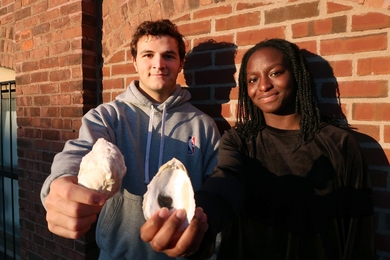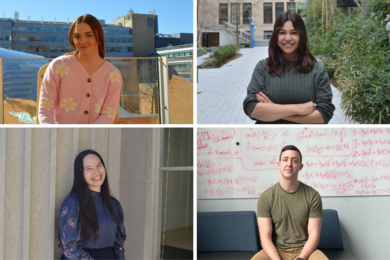The MIT Council on Family and Work is sponsoring a Quality of Life Assessment to investigate factors that contribute to a sense of community, support and mission at MIT among faculty, staff and students.
The assessment will be based on responses to a confidential Institute-wide survey being distributed to faculty and staff on campus this week, and to employees at Lincoln Laboratory in early November.
The council will use the survey findings to make recommendations to the Institute on policies, practices, infrastructure and other factors that affect the environment and culture of MIT and that can improve the quality of life at the Institute.
In a letter e-mailed to the MIT community earlier this week, President Charles M. Vest described developments at MIT and in the world that inspired the new quality-of-life survey.
"Two years ago, I reestablished the MIT Council on Family and Work and requested advice on how to make MIT a better place to work and study. Our goal is to provide an environment that promotes personal and professional growth for everyone. The devastating events of Sept. 11 have made us even more determined to strengthen our sense of community, and I am committed to this," he wrote.
President Vest encouraged full MIT community participation in the assessment process.
"I urge you to participate. This survey will give us an understanding of the factors affecting the well-being of faculty and staff and will help the council to formulate its recommendations. All of us have many tasks competing for attention, but I hope you will set aside the half hour or so that it will take to complete this important survey. Your responses will help make MIT a better place to work," he concluded.
Laura Avakian, vice president of human resources, said, "The administration is very excited in anticipation of the information it will receive from faculty and staff via the survey, and will use it to inform our thinking about how to proceed with programs that support employees, faculty and their families."
The survey, which is expected to take 20 to 30 minutes to complete, is available on the web to faculty and staff. Paper versions are being mailed to those without web access.
The co-chairs of the Quality of Life Task Force of the Council on Family and Work are Vicky Diadiuk, assistant director for operations in the Microsystems Technology Laboratories, and Roy E. Welsch, professor of statistics and management science and director of the Center for Computational Research in Economics and Management Science.
The co-chairs of the Council on Family and Work are Associate Provost Claude R. Canizares and A. Rae Simpson, co-administrator of the Family Resource Center.
Diadiuk and Welsch wrote a letter welcoming participants to the Quality of Life Assessment.
"The survey seeks your feedback on factors in the MIT work environment that affect your ability to have a fulfilling and productive professional and personal life.
"We hope you will answer the questions honestly and completely. Your participation in this study is voluntary, and the information you provide will be strictly confidential. The data are being analyzed by our external consultant, WFD, Inc., and results will be reported in summary form. No one from MIT will see individual survey results," the co-chairs said. WFD, Inc., is an international work/life consulting firm based in Watertown.
Other committee members and key contributors to the Quality of Life Assessment include Lotte Bailyn, the T Wilson Professor of Management; Noramay J. Cadena, a junior in mechanical engineering; Regina Caines, director of affirmative action/EEOC and diversity programs; Christopher D. Coldren, a postdoctoral fellow in biology; R. John Hansman Jr., professor of aeronautics and astronautics, director of the MIT International Center for Air Transportation and co-chair of the Faculty Issues Task Group (FITG); Terry W. Knight, associate professor of architecture and co-chair of the FITG; Elizabeth A. Reed, director of the Office of Career Services and Preprofessional Advising and chair of the Task Group on Workplace Flexibility; Ellen Williams, executive director of the Gender Equity Project; and Joyce D. Yaffee, director of Human Resources at Lincoln Laboratory.
A version of this article appeared in MIT Tech Talk on October 17, 2001.





